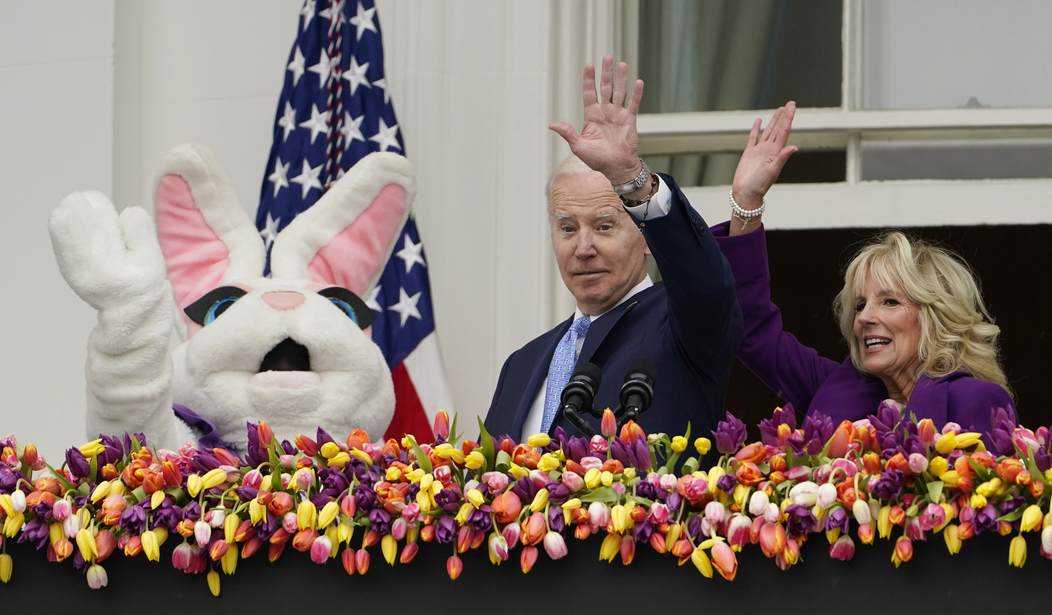The folks at the People for the Ethical Treatment of Animals (PETA) are pressuring First Lady Jill Biden to make a change in the annual White House Easter Egg Roll. PETA wants the White House to discontinue using chicken eggs.
As I was reading about this, I felt some deja vu-ish vibes. Did I write a similar post last year? As it turns out, yes I did. Last year PETA was asking Jill to substitute chicken eggs for wooden eggs or painted stones. Jill didn't accommodate PETA, though, and the event went as planned.
How about using potatoes instead of eggs this year? That is PETA's suggestion now. The animal rights group busted out many puns to make its point. PETA suggests a name change from the White House Easter Egg Roll to the White House Potato Roll. It refers to eggs as "cholesterol bombs" and notes that in starch contrast, potatoes are cheaper and healthier than eggs. Potatoes leave birds in peace.
PETA President Ingrid Newkirk's letter to Jill Biden explains its opposition to egg factory farms.
I’m writing on behalf of People for the Ethical Treatment of Animals (PETA), the world’s largest animal rights organization, with more than 5 million members and supporters in the U.S., to respectfully suggest an appeeling way to modernize the White House Easter Egg Roll—one that would be truly inclusive and welcomed by every tot who doesn’t eat eggs for religious, cultural, or environmental reasons or because they object to the way animals, including hens whose reproductive systems are exploited for eggs, are raised and killed these days. Instead of promoting the deleterious factory farming and slaughter industries, will you please initiate the annual White House Potato Roll?
Easter is not a time of renewal or joy for chickens on egg factory farms. It can take up to 36 hours in typically hellish conditions for a hen—who spends her entire life in a cage smaller than a letter-sized sheet of paper—to produce just one of the thousands of eggs slated to be used at the White House Easter Egg Roll. In starch contrast, a potato roll wouldn’t exploit any sentient beings and would encourage empathy and kindness to animals while supporting potato farmers in the U.S. Potatoes are the most popular vegetable in the country and can be safely dyed, allowing for spudtacular traditional activities, such as rolling them, seeking for them, and decorating them. You could even hold potato sack races and games of hot potato!
Amid the worst avian flu outbreak in history, in which almost 82 million birds—most of them egg-laying chickens—have been slaughtered, and during a period of rising egg prices, we’re rooting for you to leave a legacy of kindness by starting this new Easter tradition.
I don't think that children would be eggxcited to hunt for dyed potatoes. Easter is about renewal and eggs are viewed as a symbol of spring and new life. Historians say that early Christians adopted the egg as a symbol of the resurrection and the empty shell as a metaphor for Jesus’ tomb. In the medieval period eating eggs was forbidden during Lent.
Easter egg hunts have a long history with a religious origin.
The custom of the Easter egg hunt, however, comes from Germany. Some suggest that its origins date back to the late 16th century, when the Protestant reformer Martin Luther organised egg hunts for his congregation. The men would hide the eggs for the women and children to find. This was a nod to the story of the resurrection, in which the empty tomb was discovered by women.
In the German Lutheran tradition the Easter egg hunt is linked to the Easter Bunny – or the Easter Hare as he was originally known. The first written reference to the Easter Hare was in 1682 in Georg Franck von Franckenau’s essay, De ovis paschalibus (‘About Easter eggs’). However links between hares and rabbits and Easter go back earlier in central Europe. Hares were associated with fertility and with the Virgin Mary, and sometimes appear in paintings of the Virgin and Christ Child, and also in illuminated manuscripts. Custom had it that the hare would bring a basket of brightly painted eggs for all the children who had been good, and these would be hidden around the house and garden for the children to find.
Sorry, PETA. Children and families like the tradition.
The Easter Egg Roll is one of the longest traditions held at the White House, despite lawmakers trying to stop it. It was first held in 1878. Lawmakers trying to keep the public off the White House lawn were outnumbered by those wishing to implement the celebration at the White House.
The White House kitchen supplies wooden spoons for children to roll the eggs in a race. It's so popular that a lottery system is used to choose the families who participate. The event can draw almost 40,000 people each year. It was canceled for two years during the pandemic but came roaring back last year. That is when PETA began its campaign against using chicken eggs.
I don't think PETA will have any success with the White House this year. Long live the Easter Egg Roll. Remember when the Easter Bunny came to drag away President Biden from the press covering the event? Good time, good times. We'll see if he's allowed to roam the lawn this year.
The White House Easter Egg Roll is on April 1. Heh. April Fools Day seems appropriate with this White House.







Join the conversation as a VIP Member